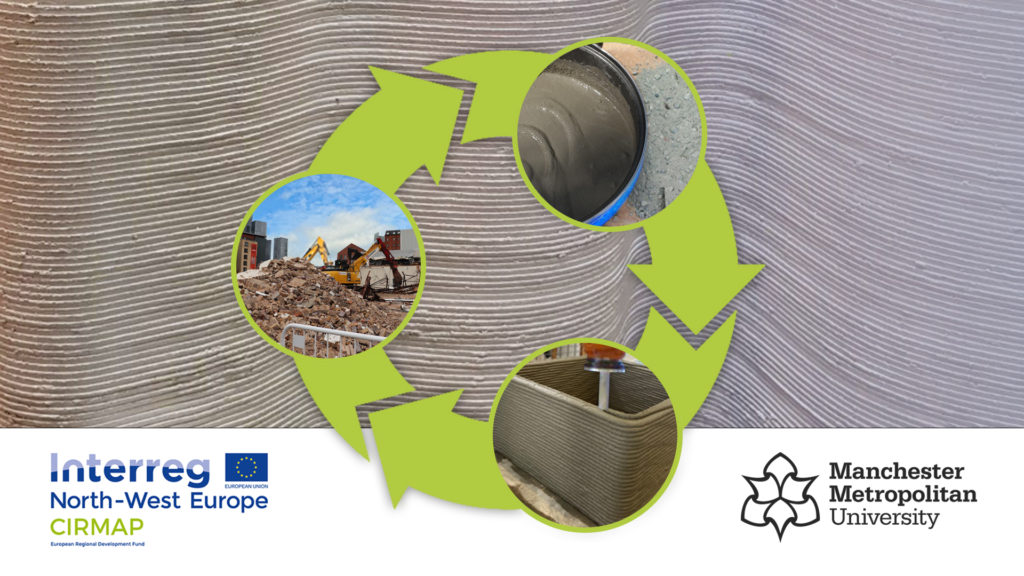Welcome to the PrintCity Monthly Round Up, the newsletter for keeping up to date with all aspects of PrintCity. Each month we will be recapping what has happened across the different areas of Manchester Metropolitan University PrintCity. Be sure to visit our round up at the end of each month to see what our team has been doing!
Key News

CIRMAP will be taking part in the annual United Nations Climate Change Conference (COP26). The aim of COP26 (Conference of Parties) is to unite countries around the world in their work to ‘protect and restore ecosystems, build defences, warning systems and resilient infrastructure and agriculture to avoid loss of homes, livelihoods and even lives’. Universities were asked to submit an image to illustrate their current research that advances our knowledge to inform action against climate change. CIRMAP has been selected to showcase the valuable research into construction waste recycling, by substituting sand with demolition waste in mortar for 3D printing cement. The benefits come from reducing waste going to landfill, reducing transport by using local materials and reducing the devastating effects from the extraction of 50 billion tonnes of sand each year. As well as being featured on the internet, there will be a physical exhibition in the Ramshorn Theatre in the centre of Glasgow for the duration of the conference.
3D Print of the Month
Congratulations to Emily Bagshaw an Interdisciplinary Designer at MMU for winning the PrintCity Excellence Award. Emily specialised in surface and material innovation, focussing upon the relationship between sensory design and biophilia to create sensorial rich, nature-derived surfaces.
Her final year project, Surface Enriched Spaces, responds to humans’ psychological need to be close to nature. Surface Enriched Spaces puts forward a sample library of 3D printed outcomes that bring tactile experience of the natural world to the built-up metropolis.
The project hopes to question the future notion of biophilic design as we transcend into increasing urbanised and digitalised living.
Research Update
On Friday 16th July, PrintCity hosted a ShaRepair workshop to promote and demonstrate methods for repairs to common consumer devices using additive manufacturing. On this occasion, the focus was a plastic box underneath a slow cooker that took the mains cord and connected through into the body of the device. The lid of the enclosure had broken first, leaving exposed wires and a replacement could not be found online. Armed with some digital callipers, this was a simple model to make in Fusion 360 with design for additive in mind so that support structures would not be needed in the 3D print. The enclosure and the lid were 3D printed on a cheap (£280) 3D printer using PLA-N filament for just £1.28.
MSc ID Highlight
Ursula Ackah was a previous Industrial Digitalisation MSc student at MMU PrintCity:
‘After almost 2 decades out of the workplace, the Industrial Digitalisation MSc has given my career a new lease of life, allowing me to develop new skills, upgrade some old ones, complete some very interesting work, and connect with numerous wonderful people, both in and outside the university. Through Jobs4Students and Made Smarter, I’ve been able to ‘earn while I learn’, working on Additive Manufacturing research projects at PrintCity and Arden Dies.’
‘Meanwhile, through the university’s ‘Rise’ programme I’ve created digital models of puppets in the Cosgrove Hall Archive* and learned some Python Programming. I’m now working part-time in Manchester School of Art’s Digital Technical Team, while my Arden internship continues, encompassing 3D print, materials research, and manufacturing process automation via scripting. It’s a great privilege, and loads of fun, to be dividing my time between the university and a local engineering company. I’m so grateful to MSc ID for preparing me to take up these exciting opportunities.’
Learn more about Ursula’s story and current projects on her blog: https://uackahmsc.wordpress.com/
Staff Spotlight
Tom Brine is the new Research Analyst for our Eco-I North West programme, delivered in partnership with the Business School, working with companies to support a reduction in the carbon footprint of operations, products, or services, by exploring emerging new technologies.
Before joining the programme, Tom spent the past 7 years working in the medical device industry, utilising his degree in Chemistry, ahead of joining MMU to study MSc Industrial Digitalisation at PrintCity.